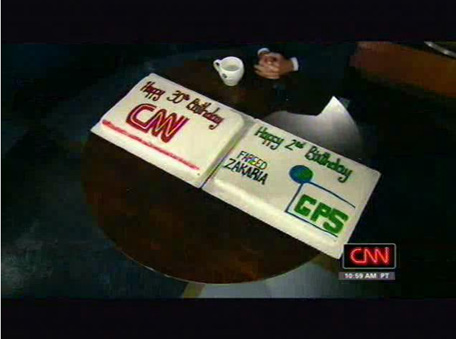CNN is 30 years old today!
The on-air celebration has been, so far, low key. There was birthday cake at the end of Fareed Zakaria’s show on Sunday.

And Fredericka Whitfield has been rolling out bits of a sit-down interview with CNN’s founder, Ted Turner.
Some highlights from the Turner interview:
On today’s CNN, Turner likes “the political coverage,” though he feels there may be “a little too much emphasis on it.” Turner sees CNN, “from the political standpoint… pretty much down the middle,” which he “agree[s] with.”
If Turner could change something about CNN today, he would
put more emphasis on the environment. We had an environmental unit with about 18 people and after I was let go, they disbanded that unit and they just cover the environment with the regular reporters, which is a good job but not as good if they were concentrating on it. I would like to see more international news and more — a little more serious, less yellow journalism. A little less who shot who.
A CNN viewer asked Turner what he thinks “of the shift from news to infotainment on television” and if he “still owned CNN,” how would he “counteract the direction of some of the competition?”
TURNER: I would have tried to stick to hard news as much as possible. We didn’t do all hard news. We did, remember Jessica who got stuck in the well? We had management meeting after that, that was such a high ratings thing, but the 24 hours that we worked to get her out, or get her out of the well, and at the — we had monthly meetings of the CNN management and somebody at the next meeting suggested that we put candy bars around all of the vacant wells in the country… [W]hen O.J. was driving around L.A. for 24 hours, we had a helicopter on him, too. When the story was big enough, we weren’t — we weren’t perfect as far as hard news is concerned.
WHITFIELD: CNN influenced all the other networks.
TURNER: Sure.
WHITFIELD: With that type of moment.
TURNER: Yeah.
WHITFIELD: You know, covering the car chase as it was happening live. People were not conditioned to seeing live events, unfolding at anytime of the day, you know. Sadly the “Challenger” so many particular moments. Do you think ultimately —
TURNER: That is what CNN was all about. It was interesting to watch. And, but for most of that time we were the only network doing it. So it does change things when you have four or five networks doing the same thing. It is almost too much of it.
WHITFIELD: It is?
TURNER: I think.
WHITFIELD: Too much because of the volume of outlets?
TURNER: Yeah. I mean, all running the same story or basically the same story.
WHITFIELD: Are there moments where you turn it off?
TURNER: Yes.
WHITFIELD: What are those moments?
TURNER: When I’m out of time.
Finally, asked if he’d ever want to work at CNN again, Turner offered that he volunteered to cover the second Gulf War for CNN “because they didn’t have anybody that would cover it at the time” and when CNN told him he didn’t have “enough experience,” he replied that “all you have to do is be able to duck and say, whoa, that was close… Anybody could do it.”
And, reflections from other folks who worked at CNN way back when: CNN’s “first editorial employee,” Daniel Schorr, discusses how CNN transformed him “from reporter into commentator;” and former CNN anchor Don Farmer muses on how “something must be done” at CNN.
Liz Cox Barrett is a writer at CJR.
